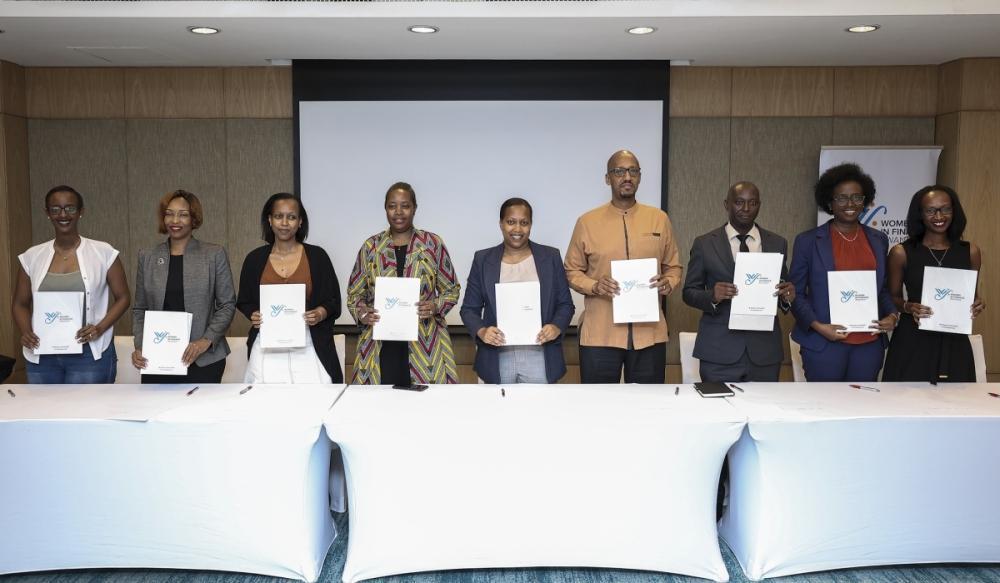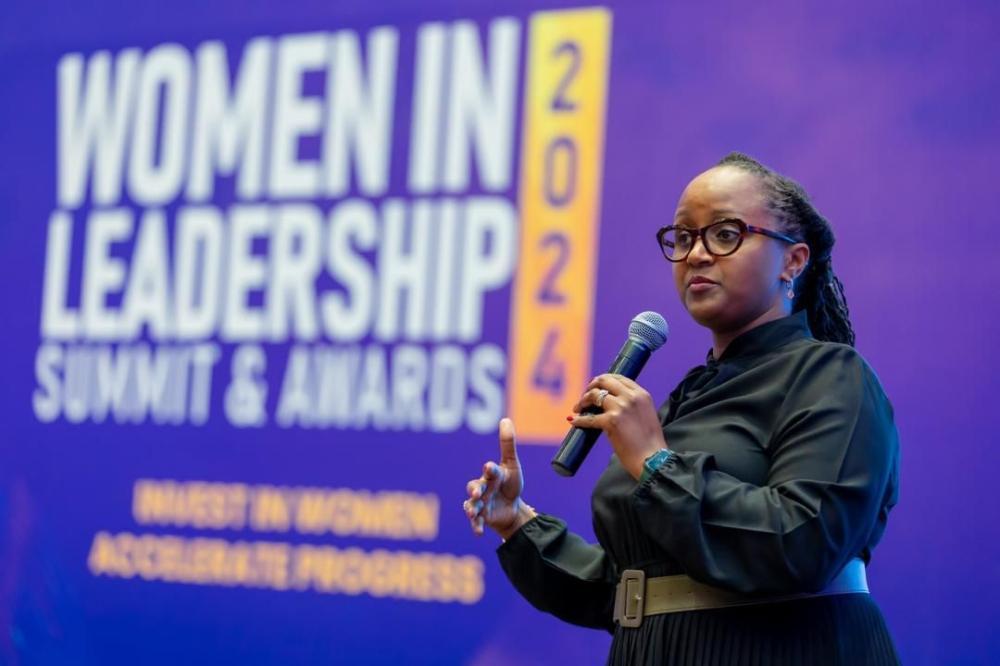Africa-Press – Rwanda. Rwanda takes pride in progress made towards achieving gender parity across different fields, and the financial sector is one witnessing an increasing number of leading women in decision-making positions.
Despite holding full-time jobs, women often shoulder a significantly larger burden of childcare, housework, and family responsibilities, which often create hurdles to career advancement.
In 2018, the National Bank of Rwanda (NBR) introduced a revised Corporate Governance Framework for the banking and insurance sectors, requiring the board of directors to consider gender diversity in executive positions with skills, and expertise aligned with the specific size, complexity, and risk profile of each institution.
Women in Finance Rwanda members pose for a group photo during the signing ceremony of the partnership aimed to develop a platform for peer-to-peer support, community engagement, and career development opportunities. PHOTO BY CHRISTIANNE MURENGERANTWARI
This initiative led to the implementation of beneficial programmes that address some of the hindrances for women’s hierarchical advancement, such as childcare facilities, mental health support services, and the development of policies promoting workplace gender equality.
However, experts in the industry acknowledge the existing gap and challenges that limit women from climbing the corporate ladder.
Kampeta Pitchette Sayinzoga, CEO of Rwanda Development Bank (BRD), says that the journey to the top is not an easy one since a woman has to navigate challenges that otherwise men don’t have to deal with.
She notes that what needs to be fixed is the unconsciously built-in gender disparity, and the issue isn’t men versus women but the patriarchal stereotypes. “The patriarchal mindset is not only in men, but also women.”
While recognizing the role of employers in enabling women to attain key positions, Sayinzoga believes initiatives such as Women in Finance Rwanda go a long way to empower and encourage women to obtain senior managerial positions.
Sayinzoga, who has a wealth of experience in Rwanda’s finance industry from leading several institutions including the Ministry of Finance and the National Industrial Research and Development Agency (NIRDA), is one who believes women should be judged fairly based on their competence.
“We are not going to promote women for the sake of promoting them,” she tells The New Times, adding that their experience and competence should drive them.
“We need to go back and ask why they are not gaining these. And as an employer, it is setting initiatives that facilitate them to acquire the expertise and experience required for them to thrive.”
Women in Finance Rwanda is a hub of women professionals that acts as a one-stop shop, offering valuable insights, peer-to-peer support, community engagement, and career development opportunities.
For Peace Uwase Masozera, a Rwandan seasoned financial expert, the path to gender equality in the C-suites requires deliberate, intentional, and sustained efforts from organisations and society.
She insists that organisations need to actively identify and cultivate female talent early on and build a pipeline without necessarily waiting for women to apply for roles or asking for promotions.
That is because women are less likely to apply for leadership positions than men, often due to self-doubt and concerns about their qualifications.
Masozera quotes a famous statistic from a Hewlett Packard internal report to shed more light on this: men apply for a job when they meet only 60 per cent of the qualifications, but women apply only if they meet 100 per cent of them.
“Companies and organizations should identify high-potential female employees who might be overlooked and share information about upcoming leadership roles, stretch projects, or development programmes,” she suggests.
This, she adds, should happen while encouraging women and supporting their growth through mentorship and leadership development specifically tailored to address the unique challenges they face.
‘Domestic vs professional responsibilities’
Masozera sets another strong precedent. While a company may require managers to possess specific certifications obtained through additional courses, young women juggling childcare with academic pursuits face a distinct disadvantage compared to male colleagues with less demanding home responsibilities.
These domestic constraints, she says, can limit a woman’s availability for work travel, pursuing additional projects, and after-hours networking, all crucial elements for professional advancement.
“This situation perpetuates stereotypes portraying women as less committed or competent, further limitingtheir chances of promotion,” she says, adding that companies are, however, increasingly implementing flexible work arrangements.
Such arrangements include remote work options and implementing on-site child care support services. “These allow mothers to re-enter the workforce sooner and maintain consistent employment.”
Prossie Kalisa, Executive Director of Retail and Digital Banking at Access Bank,
According to Prossie Kalisa, Executive Director of Retail and Digital Banking at Access Bank, while enabling more women to take on leadership positions doesn’t happen overnight, it should be intentional at all levels.
Her bank targets achieving parity at all levels and the current status seems to show that they are on the way to achieve that.
Women currently make up 49 per cent of the bank’s total staff, holding key senior positions such as the chief treasurer, chief auditor, and data scientist, among others.
The insurance sector, according to Alexis Bahizi, Managing Director of BK General Insurance, has also seen progress given that there was no female CEO in the entire sector three years ago.
That has changed with three out of the nine chief executive officers of general insurance companies in Rwanda women.
“Men are risk-takers and hasty in decision-making, so, having more women in key leadership positions brings prudence, attention to detail, and control to whatever step to make as an institution, hence, efficiency in risk management and other key aspects of work,” he argues.
It is clear that allowing more and more women to take on varied positions could easily contribute to accelerating the uptake of financial services, thereby bridging the current financial inclusion gap.
For More News And Analysis About Rwanda Follow Africa-Press








